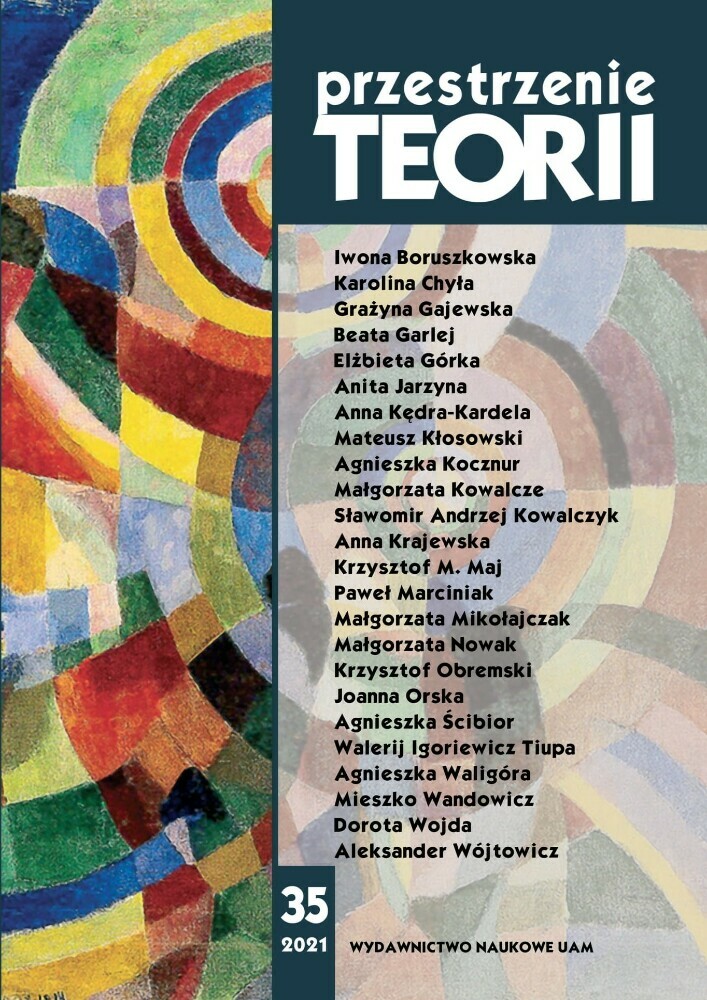Abstract
The article concerns the idea of the subject’s evolution in the poetry of Ewa Lipska. The article presents the unexplored path of subjectivity’s development in selected poems by this Cracovian poet. The main research concept regards the interpretation of particular poems from the perspective of current philosophical problems, connected with posthumanism, which is understood here as the ability to go beyond the bounds of humanism, a revision of previous humanistic assumptions. The essential change of direction in the reception of Ewa Lipska’s writings could be perceived as a result of the interpretation contained in this article.
References
Abriszewski K., Teoria Aktora-Sieci Bruno Latoura, „Teksty Drugie” 2007, nr 1–2, s. 113–126.
Badmington N., Theorizing Posthumanism, „Cultural Critique” 2003, nr 53, s. 10–27.
Bakke M., Bio-transfiguracje. Sztuka i estetyka posthumanizmu, Poznań 2010.
Barańczak S., „Nic mnie nie uratowało – żyję”, [w:] tegoż, Przed i po. Szkice o poezji krajowej przełomu lat siedemdziesiątych i osiemdziesiątych, Londyn 1988, s. 72–75.
Barańczak S., Kwit z „przechowalni ciemności”, [w:] tegoż, Przed i po. Szkice o poezji krajowej przełomu lat siedemdziesiątych i osiemdziesiątych, Londyn 1988, s. 149–152.
Czapliński P., Bednarek J.B., Gostyński D., Literatura i jej natury, Poznań 2017.
Drzewucki J., Między intelektem a wyobraźnią, „Twórczość” 2017, nr 10 (863), s. 108–111.
Ferrando F., Posthumanism, Transhumanism, Antihumanism, Metahumanism and New Materialisms Differences and Relations, „Existenz. An International Journal in Philosophy, Religion, Politics, and the Arts” 2013, Volume 8, No 2, Fall, s. 26–32.
Ferrando F., Posthumanizm, transhumanizm, antyhumanizm, metahumanizm oraz nowy materializm. Różnice i relacje, „Rocznik Lubuski” 2016, t. 42, cz. 2, s. 13–26.
Fiedorczuk J., Cyborg w ogrodzie. Wprowadzenie do ekokrytyki, Gdańsk 2015.
Fiedorczuk J., Rosiński M., Metafory w każdym życiu: fenomenologia, biosemiotyka, poezja, [w:] Po humanizmie. Od technokrytyki do animal studies, red. Z. Ładyga i J. Włodarczyk, Gdańsk 2015.
Gralewicz-Wolny I., „Ubyliśmy zwierzętom / Kto ubędzie nam”. Posthumanizm Wisławy Szymborskiej, [w:] tejże, W cudzysłowie. O literaturze polskiej XX i XXI wieku, Katowice 2016, s. 117–133.
Hassan I., Prometheus as Performer: Toward a Posthumanist Culture?, „The Georgia Review” 1977, vol. 31, nr 4 (Winter), s. 830–850.
Houellebecq M., Możliwość wyspy, Warszawa 2015.
Jelewska A., Ekotopie: ekspansja technokultury, Poznań 2014.
Kołakowski L., Obecność mitu, Kraków 1981.
Kwiatkowski J., Lipska po raz drugi, w: tegoż, Magia poezji (O poetach polskich XX wieku), Kraków 1995, s. 350–354.
Lipska E., Białe truskawki, Kraków 2000.
Lipska E., Czwarty zbiór wierszy, Warszawa 1974.
Lipska E., Drugi zbiór wierszy, Warszawa 1970.
Lipska E., Ja, Kraków 2003.
Lipska E., Miasteczko Świat, Kraków 2007.
Lipska E., Nowy wybór wierszy, Kraków 2020.
Lipska E., Pamięć operacyjna, Kraków 2017.
Lipska E., Pęknięte oko czasu (droga pani Schubert…) / L’œil fêlé du temps (chère madame Schubert…), Kraków–Budapeszt 2017.
Lipska E., Wiersze, Warszawa 1967.
Lipska E., Wspólnicy zielonego wiatraczka, Warszawa 2007.
Lipska E., Życie zastępcze, Kraków 1998.
Lisowski K., Historie osobiste (o liryce Ewy Lipskiej), [w:] E. Lipska, Wspólnicy zielonego wiatraczka, Kraków 1996, s. 5–17.
Lyotard J.-F., Przepisać nowożytność, [w:] Postmodernizm a filozofia. Wybór tekstów, red. S. Czerniak, A. Szahaj, Warszawa 1996, s. 45–58.
Michałowski P., Czytanie siebie, „Odra” 2015, nr 9, s. 110–111.
Mueller J., „Ja” z jednej strony, „Odra” 2003, nr 11, s. 132–133.
„nic nie jest pewne”. O twórczości Ewy Lipskiej, red. A. Morawiec, B. Wolska, Łódź 2005.
Piech-Klikowicz A., „Patrzymy sobie w oczy…”. O twórczości Ewy Lipskiej, Kraków 2013.
Pieczara-Ślarzyńska M., Czytnik świata, „Twórczość” 2015, R. 71, nr 12, s. 106–108.
Po humanizmie. Od technokrytyki do animal studies, red. Z. Ładyga i J. Włodarczyk, Gdańsk 2015.
Poprawa A., Lipska przez wieki się nie zmienia, „Odra” 2006, R. 46, nr 7/8, s. 118–120.
Rabizo-Birek M., Ewy Lipskiej półwiecze pisania. Laudacja dla laureatki Nagrody im. Juliana Tuwima za rok 2017, „Nowa Dekada Krakowska” 2018, nr 1 (35), s. 70–75.
Sartre J.-P., Problem bytu i nicości. Egzystencjalizm jest humanizmem, Warszawa 2001.
Schudy H., Psychoanaliza lasu. „Sekretne życie drzew” Petera Wohllebena, „Odra” 2017, nr 4, s. 27–33.
Skibski K., Antropologia wierszem. Język poetycki Ewy Lipskiej, Poznań 2008.
Szymborska W., Wystarczy, Kraków 2011.
Wyka M., Język nad przepaścią, [w:] tejże, Punkty widzenia, Kraków 2000, s. 112–120.
License
Authors
Authors of texts accepted for publication in Przestrzenie Teorii are required to complete, sign and return to the editor's office the Agreement for granting a royalty-free license to works with a commitment to grant a CC sub-license.
Under the agreement, the authors of texts published in Przestrzenie Teorii grant the Adam Mickiewicz University in Poznań a non-exclusive, royalty-free license and authorize the use of Attribution-NonCommercial-NoDerivatives 4.0 International (CC BY-NC-ND 4.0) Creative Commons sub-license.
The authors retain the right to continue the free disposal of the work.
Users
Interested Internet users are entitled to use works published in Przestrzenie Teorii since 2015, for non-commercial purposes only, under the following conditions:
- attribution - obligation to provide, together with the distributed work, information about the authorship, title, source (link to the original work, DOI) and the license itself.
- no derivatives - the work must be preserved in its original form, without the author's consent it is not possible to distribute the modified work, such as translations, publications, etc.
Copyrights are reserved for all texts published before 2015.
Miscellaneous
Adam Mickiewicz University in Poznań retains the right to magazines as a whole (layout, graphic form, title, cover design, logo etc.).
